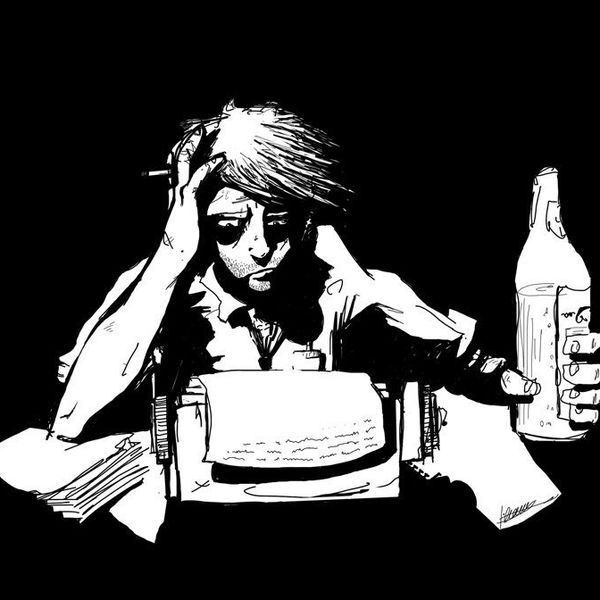You've come up with a groundbreaking idea for a story and excitedly convert your thoughts into ink, blown away by your own brilliance and innovation. Everything is moving along wonderfully: your plot is dripping with detail and unexpected twists and turns; your characters are believable and fascinating; you want to live in the world you're creating. Suddenly, you reach a pivotal moment in your story and stop. You've hit a mental block and you can feel your initial inspiration leaving you. With great frustration and impatience you realize that you've become afflicted with the author's mortal enemy: writer's block.
But don't give up hope just yet, you promising young writer! Like most afflictions, writer's block is curable, and luckily for you, I've complied a list of methods which will bring the color back to your imagination!
1. Keep a writing prompt journal.
This is actually an exercise that I started using myself this summer, and I cannot testify enough that practicing with writing prompts will increase the flow of your creative ideas. Writing prompts offer you a suggestion or topic to run with, and all the rest–tone, theme, character, mood, plot, and focus–depend entirely on your imagination. You can pull prompts from other people or you can craft your own, but be wary about which prompts you choose. You don't want prompts that are too simplistic (i.e. "describe the best day ever") because you might not feel inspired enough to write; likewise, you don't want prompts that are too complicated (i.e. "write a story about a stranger who's put on trial for kidnapping, found guilty, and left to rot in jail even though he's innocent") because then you don't have as much opportunity to take the story where you want it to go. The key is finding a happy medium (i.e. "your phone rings at 3:00 a.m. and a voice tells you they know what you did; what happens next?") and going from there.
2. Sketch a character, scene, or location.
Even if you wouldn't consider yourself particularly artistic (as far as drawing is concerned), sketching one of your characters or a part of the world inside your head can be extremely helpful when combatting writer's block. Not only are you telling your story in a different, visual medium, but you're also benefitting from the scientific perks of art including heightened attention to detail, increased emotional intelligence, and improved problem solving skills like thinking-outside-of-the-box. If you're struggling with conveying emotion or eliminating plot holes, sketching is definitely a must. Even J.K. Rowling did it!
3. Listen to music.
Listening to music while you write is an excellent way to increase your focus and enhance your mood. Studies show that music influences our emotions (if we listen to slower music we might feel more melancholy; if we listen to frantic music we might feel more excited or stressed) and helps us stay concentrated on the task at hand. If you're struggling with writer's block, putting on some tunes might create the right ambience for you to feel inspired and motivated to continue writing.
4. Edit your old writing.
Sometimes writer's block hits us in the middle of our work and we're stuck at a crossroads, contemplating what action we want our characters to take. At these times, it's always a great idea to go back and reread what you've written so that you can get reacquainted with your characters and plot. This is also an opportunity to begin the editing process since you're going to have to edit your story at some point anyway. After all, your first draft shouldn't be your final draft.
5. Find enchanted places.
What I mean by "enchanted places" is to find a secluded, quiet place that inspires you outside of the comfort and monotony of your home. Your enchanted place could be a hidden garden on a building rooftop in the city, a woodland glade or meadow, a pebbled beach–anywhere that puts your mind at ease and gives your heart insight. Use your time in your enchanted place to mediate or write and you'll leave feeling more inspired than when you arrived.
6. Read.
If all else fails, reading is guaranteed to cure your writer's block. In fact, you should never stop reading while you're writing. By exposing yourself to various great works of literature and published authors, you'll expand your vocabulary, increase your analytical ability, and improve your own writing as you pick up on the prose techniques of others. Besides, who wouldn't want to claim reading as part of their "research" when pestered by non-readers?



























